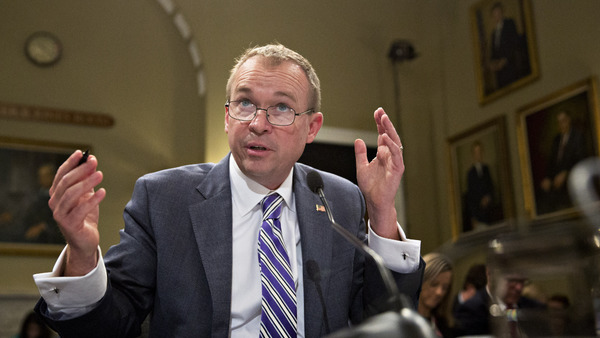
As a federal court prepares to determine whether his appointment is legal, Acting CFPB Director Mick Mulvaney Thursday announced that the agency will not assess penalties for Mortgage Disclosure Act data collected in 2018 and reported in 2019 and will change its rule governing prepaid accounts.
The announcements came as Mulvaney begins leaving a Trump Administration imprint on the agency, from changing its mission statement to changing the name of a scholar’s program.
The moves are further signs that Mulvaney, an outspoken critic of the agency, intends to roll back the aggressive rulemaking the agency pushed under the regime of former Director Richard Cordray.
Cordray was appointed by former President Barack Obama. Following Cordray’s resignation, President Trump appointed Mulvaney, the director of the Office of Management and Budget, as acting director of the CFPB. That appointment is being challenged in federal court by Leandra English, Cordray’s choice to serve as director.
A D.C. federal court is scheduled to hold a hearing on English’s challenge Friday.
Meanwhile, Mulvaney is making moves to ensure that the Trump Administration leaves its imprint on the agency, reportedly moving Trump administration supporters into key roles in the bureau.
Prepaid Cards
The bureau said Thursday that it expects to issue final rule amending its 2016 rule governing prepaid accounts. The agency said that based on comments received, the bureau expects to further extend the effective date of the 2016 rule to allow additional time for its implementation.
Credit union trade groups had sought the delay.
“We’re pleased to see the CFPB announce the implementation delay of the rule, which we have stated will provide issuers and vendors adequate time to make the required changes,” said CUNA Chief Advocacy Officer Ryan Donovan.
NAFCU officials also were pleased.
“While NAFCU continues to believe that the prepaid rule should not apply to credit union issuers of prepaid accounts, we welcome the prospect of having additional time to implement it,” said Andrew Morris, NAFCU’s regulatory affairs counsel.
HMDA Rules
And in another move hailed by the credit union industry, the CFPB Thursday announced that it will not assess penalties for Mortgage Disclosure Act data collected in 2018 and reported in 2019.
That move is being coordinated with the NCUA and other financial regulators.
The bureau also announced that it is reconsidering other aspects of the HMDA, such as he institutional and transactional coverage tests and the rule’s discretionary data points.
The bureau said that it will not require resubmission of data collected in 2018 and reported in 2019. Beginning January 1, financial institutions will submit HMDA data collected in 2017, using the bureau’s new online platform.
“The Bureau recognizes the significant systems and operational challenges needed to meet the impending requirements under the rule,” the agency said, in explaining the moves.
Credit unions have been pushing for changes in the HMDA rules.
“This is a significant win for credit unions, as CUNA has urged the bureau for years for relief from HMDA requirements that place a heavy burden on credit unions,” said CUNA President/CEO Jim Nussle. “Credit unions will be unduly burdened by the data reporting requirements finalized in October 2015, and CUNA will fully engage with the bureau during this rulemaking process to ease these reporting requirements on credit unions.”
“The 2015 HMDA rule requires collecting a significantly greater number of data points than what was mandated by Dodd-Frank, and relief for smaller institutions was only temporary, said Brandy Bruyere, NAFCU’s vice president of regulatory compliance. “NAFCU is glad to see the CFPB, under acting Director Mulvaney’s leadership, is willing to hear credit unions’ concerns.”
“The agency is taking a prudent position on the HMDA changes, said Paul Gentile, president/CEO of the Cooperative Credit Union Association.
“The agency should not be quick to penalize institutions, especially credit unions, as the new provisions take effect,” he said.
Gentile added, “Credit unions were never part of the problem that created HMDA and aren’t problem now. We welcome the CFPB’s announcement today and encourage to make further change to lessen the HMDA burden on credit unions.
Cosmetic Changes
The agency also is making more subtle changes.
The agency also appears to have changed its mission from a bureau that makes rules more effective to one that addresses burdensome regulations.
Under Cordray, the closing paragraph of agency statements read, “The Consumer Financial Protection Bureau is a 21st century agency that helps consumer finance markets work by making rules more effective, by consistently and fairly enforcing those rules, and by empowering consumers to take more control over their economic lives.”
Now, the statement reads, “The Consumer Financial Protection Bureau is a 21st century agency that helps consumer finance markets work by regularly identifying and addressing outdated, unnecessary, or unduly burdensome regulations, by making rules more effective, by consistently enforcing federal consumer financial law, and by empowering consumers to take more control over their economic lives.”
Finally, the bureau has renamed a scholar’s program the agency offers. The program previously was called the Louis D. Brandeis Honors Attorney Program and was named after a Supreme Court Justice who was a noted consumer advocate.
This week, the bureau renamed the program the “Joseph Story Honors Attorney Program.,” named after a Supreme Court Justice who was a longtime property rights advocate.


